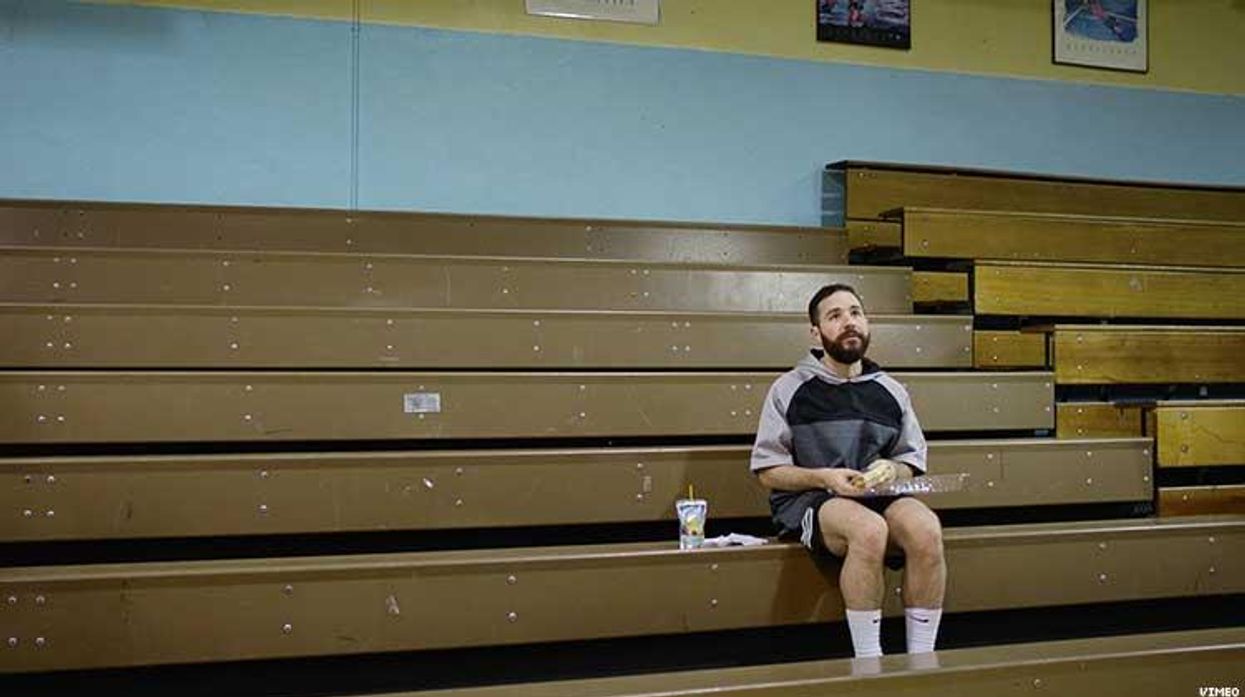film
Finally, a Film for Gays Who 'Can't Play Basketball'

Nick Borenstein discusses the inspiration behind his comedic short Pete Can't Play Basketball, premiering exclusively with The Advocate.
January 26 2021 6:28 AM EST
dnlreynolds
By continuing to use our site, you agree to our Privacy Policy and Terms of Use.

Nick Borenstein discusses the inspiration behind his comedic short Pete Can't Play Basketball, premiering exclusively with The Advocate.
Can't do a layup? You're not alone.
Nick Borenstein's latest film, Pete Can't Play Basketball, is an ode to queer people who have been ostracized in their social lives due to an inability to play a sport, as well as the anxieties that dribble along with it.
"Culturally, my disinterest in sports always felt unacceptable and I inherited the belief that this aversion made me inferior," Borenstein told The Advocate. "Tracking a character who didn't like sports and was openly discredited for that felt like a great opportunity to explore otherness through a silly yet very real metaphor."
Borenstein wrote, directed, and starred in the comedic short film, which screened at NewFest, InsideOut, and the Cannes Short Film Festival before premiering online exclusively with The Advocate below. In it, a grown-up Pete recounts his mixed history with basketball in his youth -- and how his lack of skills impact his present-day work, love, and social lives.
The goal of the film, said Borenstein, is to inspire folks to overcome their fears and "just do it" when it comes to athletics -- or maybe just brighten their day. "I want Pete to give viewers a sense of joy, pride, and acceptance for themselves and for their experiences," he said. "We've endured such a heavy and difficult year, we could all use a smile.
Watch the film below, followed by a Q&A with Borenstein over its inspiration.
The Advocate: What was the inspiration for the film?
Nick Borenstein: I like to explore difficult themes through humor, and I often find myself traversing ideas of worth and otherness. I never liked sports. I also never liked that I never liked sports. Culturally, my disinterest in sports always felt unacceptable, and I inherited the belief that this aversion made me inferior. Tracking a character who didn't like sports and was openly discredited for that felt like a great opportunity to explore otherness through a silly yet very real metaphor.
Why basketball?
Truthfully, it was the only sport with rules that I understand. Pete Can't Play Tennis probably would've been a meditation on why "love" is associated with score evaluation.
Has your inability to be good at a sport impacted your social life?
When I was younger, my aversion to sports felt like a social disadvantage. I used the sports metaphor in the film to portray a character who was completely capable but always ostracized. Where basketball skills are the most important social value in the world of Pete, our society creates a similar system of value judgments. I wanted to highlight how ridiculous these judgments can be. We can be terrible or wonderful at sports, but ultimately those values and traits are not the basis of our worth. Fortunately, I found other things I was passionate about, like writing, dancing, and the Spice Girls. Like Pete, I also found a community that accepted that.
Not to stereotype, but there's a lot of queer men who hate sports. Why do you think that is?
I was always bad at sports. Whether it was my sexuality, my height, or my genuine lack of interest, throwing an object around a field just wasn't for me. There are plenty of queer men who love sports. For me, Spice World is better than any Super Bowl.
What advice would you give to folks who want to play a sport but fear rejection?
Just do it. See, I know some sports stuff.
What message did you want your film to send to viewers?
Like with my past films and the feature that I am developing, I want Pete to give viewers a sense of joy, pride, and acceptance for themselves and for their experiences. We've endured such a heavy and difficult year, we could all use a smile. I'd also like everyone to appreciate that I was able to make a basket on camera.
Charlie Kirk DID say stoning gay people was the 'perfect law' — and these other heinous quotes